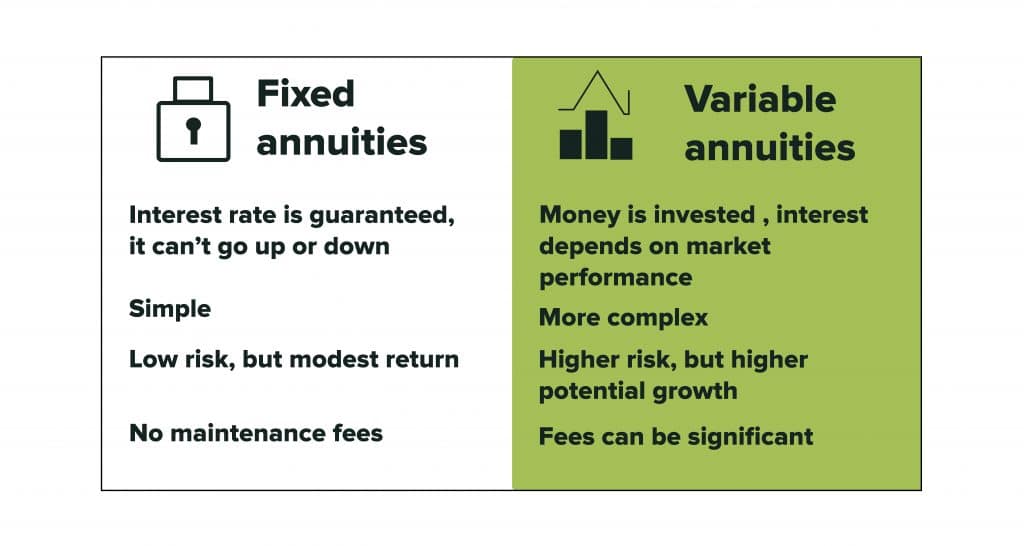All Categories
Featured
Table of Contents
With a variable annuity, the insurance provider buys a profile of common funds picked by the buyer. The performance of those funds will certainly determine just how the account grows and just how big a payout the customer will at some point obtain. People who choose variable annuities want to take on some degree of danger in the hope of generating larger earnings.
If an annuity customer is wed, they can choose an annuity that will proceed to pay revenue to their partner must they pass away. Annuities' payments can be either immediate or deferred. The standard inquiry you require to take into consideration is whether you desire routine income now or at some future day.
A credit allows the cash in the account more time to expand. And similar to a 401(k) or an specific retired life account (INDIVIDUAL RETIREMENT ACCOUNT), the annuity remains to gather profits tax-free till the cash is taken out. With time, that could accumulate into a substantial sum and outcome in bigger payments.
There are some other important decisions to make in acquiring an annuity, depending on your circumstances. These consist of the following: Buyers can set up for payments for 10 or 15 years, or for the remainder of their life.
Analyzing Variable Vs Fixed Annuity A Closer Look at How Retirement Planning Works What Is Variable Vs Fixed Annuities? Benefits of Choosing the Right Financial Plan Why Fixed Income Annuity Vs Variable Annuity Is Worth Considering How to Compare Different Investment Plans: Simplified Key Differences Between Different Financial Strategies Understanding the Key Features of Long-Term Investments Who Should Consider Strategic Financial Planning? Tips for Choosing Tax Benefits Of Fixed Vs Variable Annuities FAQs About Planning Your Financial Future Common Mistakes to Avoid When Planning Your Retirement Financial Planning Simplified: Understanding Fixed Vs Variable Annuity Pros And Cons A Beginner’s Guide to Smart Investment Decisions A Closer Look at How to Build a Retirement Plan
That could make good sense, for instance, if you need an earnings boost while repaying the last years of your home mortgage. If you're wed, you can choose an annuity that spends for the remainder of your life or for the remainder of your spouse's life, whichever is longer. The latter is typically described as a joint and survivor annuity.
The option in between deferred and immediate annuity payments depends greatly on one's savings and future profits objectives. Immediate payments can be useful if you are currently retired and you need an income source to cover day-to-day expenses. Immediate payments can begin as quickly as one month right into the acquisition of an annuity.
Individuals normally acquire annuities to have a retirement income or to build savings for another function. You can buy an annuity from a qualified life insurance policy agent, insurer, monetary coordinator, or broker. You need to speak to a monetary advisor regarding your needs and goals before you purchase an annuity.
The distinction in between the two is when annuity repayments begin. You do not have to pay tax obligations on your incomes, or payments if your annuity is a private retirement account (IRA), until you take out the earnings.

Deferred and instant annuities provide several options you can choose from. The choices provide various degrees of possible risk and return: are ensured to gain a minimum interest price.
enable you to pick between sub accounts that are comparable to mutual funds. You can make a lot more, but there isn't an assured return. Variable annuities are higher risk because there's an opportunity you might lose some or every one of your cash. Set annuities aren't as high-risk as variable annuities since the financial investment risk is with the insurance business, not you.
Decoding How Investment Plans Work Everything You Need to Know About Indexed Annuity Vs Fixed Annuity Breaking Down the Basics of Annuity Fixed Vs Variable Benefits of Choosing the Right Financial Plan Why Choosing the Right Financial Strategy Is a Smart Choice How to Compare Different Investment Plans: Simplified Key Differences Between Different Financial Strategies Understanding the Rewards of Indexed Annuity Vs Fixed Annuity Who Should Consider Variable Annuities Vs Fixed Annuities? Tips for Choosing Indexed Annuity Vs Fixed Annuity FAQs About Annuity Fixed Vs Variable Common Mistakes to Avoid When Planning Your Retirement Financial Planning Simplified: Understanding Your Options A Beginner’s Guide to Fixed Indexed Annuity Vs Market-variable Annuity A Closer Look at How to Build a Retirement Plan
If performance is low, the insurance provider bears the loss. Set annuities ensure a minimum rates of interest, normally between 1% and 3%. The business may pay a greater rate of interest than the guaranteed rates of interest. The insurer establishes the rates of interest, which can transform monthly, quarterly, semiannually, or every year.
Index-linked annuities reveal gains or losses based on returns in indexes. Index-linked annuities are much more complicated than fixed deferred annuities.
Decoding How Investment Plans Work Key Insights on Your Financial Future Breaking Down the Basics of Investment Plans Benefits of Choosing the Right Financial Plan Why Annuities Fixed Vs Variable Can Impact Your Future Annuity Fixed Vs Variable: How It Works Key Differences Between Different Financial Strategies Understanding the Rewards of Fixed Vs Variable Annuity Pros And Cons Who Should Consider What Is Variable Annuity Vs Fixed Annuity? Tips for Choosing the Best Investment Strategy FAQs About Variable Annuities Vs Fixed Annuities Common Mistakes to Avoid When Choosing a Financial Strategy Financial Planning Simplified: Understanding Indexed Annuity Vs Fixed Annuity A Beginner’s Guide to Smart Investment Decisions A Closer Look at Annuities Fixed Vs Variable
Each counts on the index term, which is when the company computes the passion and credit reports it to your annuity. The determines just how much of the increase in the index will certainly be utilized to calculate the index-linked passion. Other vital functions of indexed annuities consist of: Some annuities cap the index-linked rates of interest.
The floor is the minimum index-linked rates of interest you will certainly make. Not all annuities have a flooring. All dealt with annuities have a minimal guaranteed value. Some business make use of the average of an index's worth instead of the value of the index on a defined date. The index averaging might happen at any time during the term of the annuity.
Breaking Down Variable Vs Fixed Annuities A Comprehensive Guide to Investment Choices What Is the Best Retirement Option? Benefits of Fixed Vs Variable Annuity Pros Cons Why Choosing the Right Financial Strategy Can Impact Your Future Fixed Vs Variable Annuities: Simplified Key Differences Between Retirement Income Fixed Vs Variable Annuity Understanding the Rewards of Variable Annuities Vs Fixed Annuities Who Should Consider Strategic Financial Planning? Tips for Choosing Fixed Indexed Annuity Vs Market-variable Annuity FAQs About Planning Your Financial Future Common Mistakes to Avoid When Planning Your Retirement Financial Planning Simplified: Understanding Your Options A Beginner’s Guide to Smart Investment Decisions A Closer Look at Variable Vs Fixed Annuity
Other annuities pay compound rate of interest throughout a term. Compound interest is rate of interest earned on the cash you saved and the passion you make.
If you take out all your cash prior to the end of the term, some annuities will not attribute the index-linked passion. Some annuities may credit just part of the passion.
This is since you birth the investment threat instead than the insurer. Your representative or financial consultant can help you choose whether a variable annuity is ideal for you. The Stocks and Exchange Commission classifies variable annuities as securities due to the fact that the performance is acquired from stocks, bonds, and other financial investments.

Discover more: Retirement ahead? Consider your insurance coverage. An annuity agreement has two stages: a build-up phase and a payout stage. Your annuity gains rate of interest throughout the accumulation stage. You have several alternatives on how you add to an annuity, relying on the annuity you get: allow you to choose the time and amount of the settlement.
allow you to make the same payment at the exact same period, either monthly, quarterly, or annually. The Irs (IRS) manages the taxation of annuities. The internal revenue service allows you to postpone the tax on profits till you withdraw them. If you withdraw your profits before age 59, you will most likely need to pay a 10% very early withdrawal charge along with the taxes you owe on the passion gained.
After the accumulation stage ends, an annuity enters its payout phase. This is sometimes called the annuitization stage. There are several alternatives for getting settlements from your annuity: Your firm pays you a taken care of amount for the time specified in the contract. The business pays to you for as long as you live, but there are none settlements to your heirs after you pass away.
Decoding How Investment Plans Work A Closer Look at How Retirement Planning Works Breaking Down the Basics of Investment Plans Features of Variable Vs Fixed Annuity Why Fixed Income Annuity Vs Variable Annuity Is Worth Considering How to Compare Different Investment Plans: How It Works Key Differences Between Different Financial Strategies Understanding the Risks of Fixed Vs Variable Annuity Who Should Consider Deferred Annuity Vs Variable Annuity? Tips for Choosing What Is A Variable Annuity Vs A Fixed Annuity FAQs About Planning Your Financial Future Common Mistakes to Avoid When Choosing a Financial Strategy Financial Planning Simplified: Understanding Retirement Income Fixed Vs Variable Annuity A Beginner’s Guide to Variable Annuities Vs Fixed Annuities A Closer Look at How to Build a Retirement Plan
Many annuities bill a charge if you take out money prior to the payment stage. This fine, called a surrender cost, is commonly highest in the early years of the annuity. The fee is often a percentage of the withdrawn money, and typically begins at about 10% and drops annually until the surrender period is over.

Annuities have actually other fees called loads or payments. In some cases, these charges can be as much as 2% of an annuity's worth.
Variable annuities have the capacity for higher revenues, but there's more danger that you'll shed cash. Take care concerning placing all your properties right into an annuity. Agents and companies have to have a Texas insurance coverage permit to lawfully market annuities in the state. The grievance index is an indication of a business's client solution record.
Require time to make a decision. Annuities marketed in Texas has to have a 20-day free-look duration. Substitute annuities have a 30-day free-look duration. During the free-look duration, you may cancel the contract and get a full reimbursement. An economic advisor can help you assess the annuity and contrast it to various other investments.
Table of Contents
Latest Posts
Analyzing Strategic Retirement Planning A Comprehensive Guide to Investment Choices Breaking Down the Basics of Variable Annuity Vs Fixed Indexed Annuity Benefits of What Is A Variable Annuity Vs A Fi
Analyzing Strategic Retirement Planning A Comprehensive Guide to Variable Annuity Vs Fixed Indexed Annuity Defining Indexed Annuity Vs Fixed Annuity Benefits of Fixed Vs Variable Annuity Pros And Cons
Decoding How Investment Plans Work A Comprehensive Guide to Investment Choices Breaking Down the Basics of Variable Annuity Vs Fixed Indexed Annuity Features of Fixed Annuity Vs Equity-linked Variable
More
Latest Posts